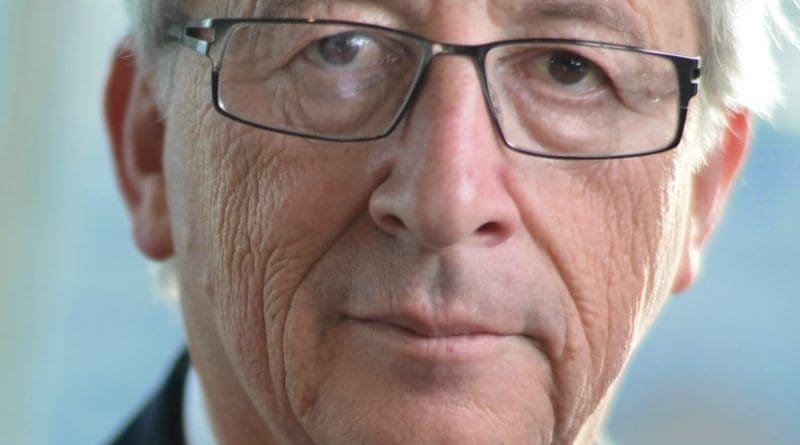EU’s Juncker Unveils Mandatory Migration Crisis Plan
By RFE RL
(RFE/RL) — European Commission President Jean-Claude Juncker has unveiled an emergency plan for dealing with Europe’s biggest influx of migrants and asylum seekers since World War II.
Delivering his first EU state-of-the-union speech to the European Parliament on September 9, Juncker outlined a proposal for a compulsory program to relocate across the European Union a total of 160,000 refugees who are currently in Greece, Hungary, and Italy.
Juncker said the program would involve mandatory quotas on the number of refugees, mostly from Syria, that each EU country should host.
He said the program would expand on a proposal made by the European Commission in May for the relocation of 40,000 refugees in Italy and Greece — adding an additional 120,000 refugees to the program.
“We are not talking about 40,000,” Juncker said. “We are not talking about 120,000. It’s 160,000. That’s the number Europeans have to take in charge and have to take in their arms.”
“This has to be done in a compulsory way,” Juncker said, urging EU member states to support the plan at a meeting of EU interior ministers scheduled for September 14.
Juncker said the EU should create a “permanent relocation mechanism” that would allow national authorities to deal with refugee crises more swiftly in the future.
“Where Europe has clearly under-delivered is on common solidarity with regard to the refugees who have arrived on our territory,” Juncker told the European Parliament.
“To me, it is clear that the member states where most refugees first arrive — and at the moment, these are Italy, Greece, and Hungary — cannot be left alone to cope with this enormous challenge,” he said.
Germany, the main destination for many migrants, supports quotas. But some EU countries such as Hungary, a key point on a migrant route, oppose a compulsory system.
After Juncker’s speech, Slovakia’s Foreign Minister Miroslav Lajcak repeated Bratislava’s rejection of proposals on how many migrants must be taken by each EU member state.
He said Slovakia also opposed giving the Europe Commission too much power in dealing with the refugee crisis.
Czech Prime Minister Bohuslav Sobotka said Prague also opposed mandatory quotas, but he welcomed the commission’s plan to put more focus on long-term measures to deal with increasing numbers of refugees reaching its borders.
Sobotka reacted to Juncker’s speech by saying that Europe neeed to implement measures that it already has agreed upon in recent months, rather than drafting new plans.
Another proposal by the European Commission is to create what Juncker called a “list of safe countries” that would allow national authorities in each EU member country to more quickly streamline their efforts to cope with the unprecedented flow of refugees arriving in Europe form war-torn Syria.
“The list of safe countries is only a procedural simplification,” Juncker explained. “It cannot take away, and I would act strongly against that, the fundamental right of asylum for asylum seekers coming from Albania, Bosnia and Herzegovina, the former Yugoslav republic of Macedonia, Kosovo, Montenegro, Serbia, and Turkey,” Juncker continued.
“But it allows national authorities to focus on those refugees which are much more likely to be granted asylum — notably those from Syria,” he said. “And this focus is very much needed in the current situation.”
Juncker also said countries on the proposed safe list would be obliged to maintain a good record on human rights.
“The countries being on the list of safe countries have to know that if they are taken off of this list because fundamental rights would not be ensured in these countries, they are losing their chance to join the European Union,” Juncker warned. “These two things are going together.”
Juncker also announced that the European Commission would propose an integrated legal migration policy early in 2016 that opens legal channels for migrants.
He said that migration policy would discourage human smuggling by criminal organizations and reduce the number of tragedies involving ships and trucks that smuggle migrants illegally.
Juncker also argued asylum seekers should be given the right to work and earn money in their host countries while their asylum applications are being processed.
He vowed that the European Union’s borderless Schengen system “will not be abolished” under the mandate of the current European Commission.
But he said EU member countries in the Schengen area must work more closely together in order to manage their internal borders.
Juncker said Europe had seen an influx of nearly 500,000 migrants and refugees since the start of 2015, including those from the Middle East and Africa.

